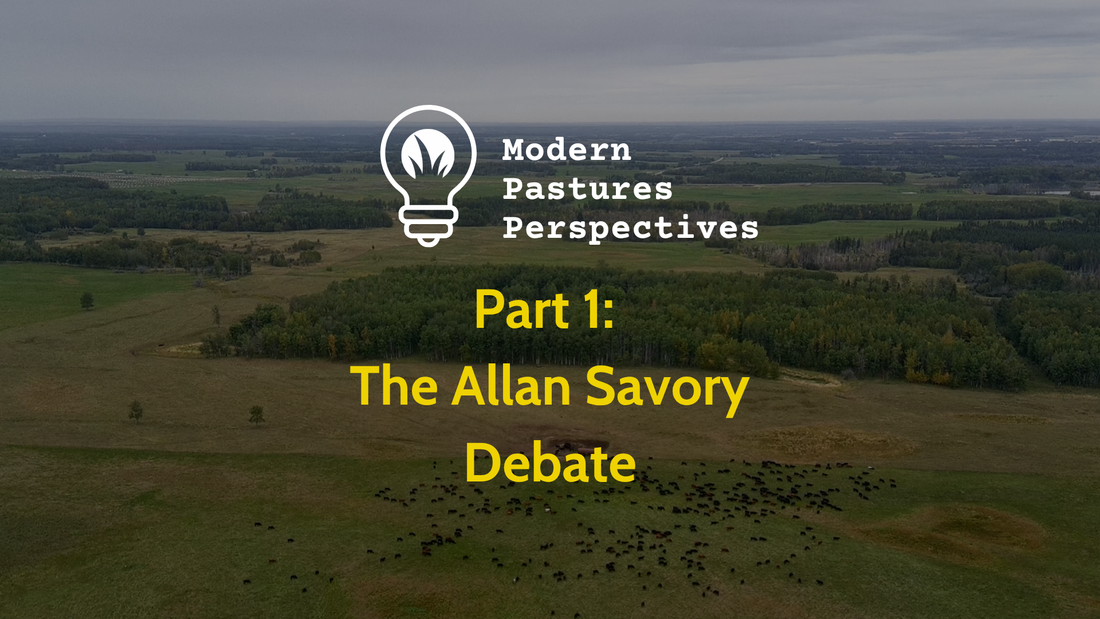
The Scientific Debate Around Allan Savory's Holistic Management
A balanced examination of the evidence for and against one of regenerative agriculture's most controversial figures
Few names in the world of sustainable agriculture and land management stir as much debate as Allan Savory. The Zimbabwean ecologist and originator of Holistic Management has been both praised as a visionary and criticized as unscientific. His claim that properly managed livestock can reverse desertification and potentially mitigate climate change has become a lightning rod in discussions about sustainable agriculture.
At Modern Pastures, we believe in following the evidence, understanding complex systems, and making informed decisions about land management. This post examines both the criticisms and support for Savory's methods, drawing from peer-reviewed research and expert analysis.
The Savory Approach: Understanding Holistic Management
Before diving into the debate, it's worth clarifying what Savory actually advocates. Holistic Management is a decision-making framework and planning system that uses managed livestock to mimic the natural behaviors of wild herbivores. Savory argues that in brittle environments (those with seasonal rainfall), large herds of grazing animals historically moved across landscapes in dense groups, intensively grazing areas for short periods before moving on. This pattern of "bunching and moving" provided:
- Trampling of plant material into the soil
- Breaking of soil crusts to improve water infiltration
- Adequate recovery periods for vegetation
- Nutrient cycling through manure and urine
Rather than seeing livestock as a problem, Savory positions them as essential tools in ecosystem restoration when properly managed—moving frequently, never grazing plants too severely, and allowing adequate recovery time.
The Scientific Case Against Savory's Methods
Critics of Savory's approach point to several significant concerns:
Lack of Reproducible Scientific Evidence
A group of rangeland scientists led by David Briske at Texas A&M University published a critique stating that Savory's claims "are not only unsupported by scientific information, but they are often in direct conflict with it." Their 2013 review in the Journal of Range Management concluded: "We find all of Mr. Savory's major claims to be unfounded."
Many controlled scientific studies have failed to validate the superiority of rotational grazing systems over other well-managed approaches. Critics argue that extraordinary claims require extraordinary evidence, and the scientific community has not found consistent, reproducible results supporting Savory's most ambitious claims.
Exaggerated Climate Claims
Perhaps most controversial was Savory's 2013 TED Talk claim that holistic planned grazing on half the world's grasslands could bring atmospheric carbon dioxide to pre-industrial levels. The Food Climate Research Network examined this claim and found it "unrealistic" and inconsistent with peer-reviewed estimates of carbon sequestration potential.
Ecological Misunderstandings
Some ecologists have challenged Savory's characterization of certain ecosystems. For example, Savory referred to desert algae crust as a "cancer of desertification" when many desert ecologists consider it a vital part of arid ecosystem health. This suggests potential misunderstandings about the natural state of certain environments.
Methodological Concerns
Critics point out that Savory's resistance to conventional scientific testing makes his claims difficult to evaluate. He has stated that "Holistic management does not permit replication," which creates a fundamental disconnect with standard scientific methodology that relies on replicable results.
The Scientific Support for Savory's Approach
Despite these criticisms, a growing body of research provides support for elements of Savory's approach:
Field Evidence of Success
Dr. Richard Teague, a rangeland scientist also at Texas A&M, has conducted research comparing neighboring ranches using different management strategies. His 2011 study found that Adaptive Multi-Paddock (AMP) grazing (based on Savory's principles) was superior to heavy continuous grazing for soil health, water conservation, and ecosystem services on commercial ranches in north Texas.
Carbon Sequestration Potential
While perhaps not at the scale Savory originally suggested, properly managed grazing does appear to increase soil carbon in certain contexts. Teague's research demonstrates that AMP grazing combined with regenerative cropping can enhance soil carbon sequestration while improving ecosystem services and reducing greenhouse gas emissions.
Scale and Context Considerations
Supporters argue that many studies criticizing holistic management were conducted at scales too small or timeframes too short to capture its benefits. Jason Rowntree of Michigan State University and others have suggested that benefits emerge at farm scales (over 2 hectares) rather than in the small experimental plots often used in academic research.
Holistic Framework Value
Hannah Gosnell's comprehensive 2020 review "A half century of Holistic Management: what does the evidence reveal?" suggests that much of the controversy stems from narrow research parameters that fail to account for the integrated social-ecological frameworks that holistic management addresses. The management process itself—adaptive, context-specific, and focused on whole systems—may be as important as the specific grazing techniques.
Finding Middle Ground in the Debate
The most balanced assessment suggests that Holistic Management:
- May be beneficial in certain contexts and ecosystems, particularly in brittle environments with evolutionary histories of large herbivores
- Has shown positive results in some field studies, though these aren't always reproducible in controlled experiments
- Incorporates valuable social and managerial elements that are difficult to capture in traditional scientific studies
- Requires proper implementation and adaptation to local conditions to be effective
The strongest critiques of Savory often focus on his most ambitious claims rather than the practical implementation of his methods by skilled managers. Conversely, the strongest support comes from practitioners and researchers working on real farms in specific contexts where these approaches have demonstrated success.
Moving Beyond the Polarized Debate
Perhaps most importantly, the debate about Savory's work has pushed the scientific community to reconsider how we evaluate complex agricultural systems. The recognition that management matters as much as the presence or absence of livestock has led to more nuanced research approaches.
The most productive path forward likely involves:
- Acknowledging both the potential benefits and limitations of these approaches
- Recognizing the importance of context, implementation, and management skill
- Conducting more research at appropriate scales and timeframes
- Moving beyond polarized positions to embrace complexity
At Modern Pastures, we believe that thoughtful, evidence-informed management is key to regenerating landscapes. While no single approach works universally, the principles of managed grazing, when applied with skill and adapted to local conditions, offer promising tools for land managers seeking to build soil health, increase biodiversity, and improve ecosystem function.
The debate around Savory's work continues to evolve, but it has undeniably catalyzed essential conversations about how we manage land and livestock in service of both human and ecological wellbeing—a conversation we're committed to advancing through practice, education, and ongoing engagement with the best available evidence.
